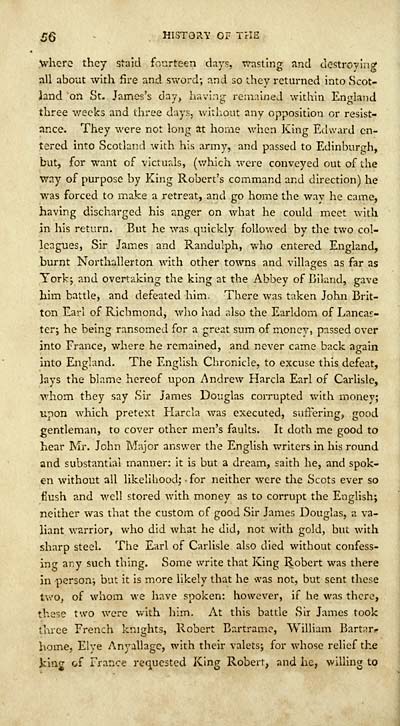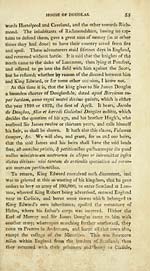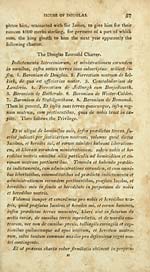History of the house and race of Douglas and Angus
(84) Page 56
Download files
Complete book:
Individual page:
Thumbnail gallery: Grid view | List view

56 HISTORY OF THE
Where they staid fourteen days, wasting and destroying
all about with fire and sword; and so they returned into Scot-
land on St. James's day, having remained within England
three weeks and three days, without any opposition or resist-
ance. They were not long at home when King Edward en-
tered into Scotland with his army, and passed to Edinburgh,
but, for want of victuals, (which were conveyed out of the
way of purpose by King Robert's command and direction) he
was forced to make a retreat, and go home the way he came,
having discharged his anger on what he could meet with
in his return. But he was quickly followed by the two col-
leagues, Sir James and Randulph, who entered England,
burnt Northallerton with other towns and villages as far as
York; and overtaking the king at the Abbey of Biland, gave
him battle, and defeated him. There was taken John Brit-
ton Earl of Richmond, who had also the Earldom of Lancas-
ter; he being ransomed for a great sum of money, passed over
into France, where he remained, and never came back again
into England. The English Chronicle, to excuse this defeat,
lays the blame hereof upon Andrew Harcla Earl of Carlisle,
whom they say Sir James Douglas corrupted with money;
upon which pretext Karcla was executed, suffering, good
gentleman, to cover other men's faults. It doth me good to
hear Mr. John Major answer the English writers in his round
and substantial manner: it is but a dream, saith he, and spok-
en without all likelihood; • for neither were the Scots ever so
flush and well stored with money as to corrupt the English;
neither was that the custom of good Sir James Douglas, a va-
liant warrior, who did what he did, not with gold, but with
sharp steel. The Earl of Carlisle also died without confess-
ing any such thing. Some write that King Robert was there
in person; but it is more likely that he was not, but sent these
two, of whom we have spoken: however, if he was there,
these two were with him. At this battle Sir James took
three French knights, Robert Bartrame, William Bartar-
home, Elye Anyallagc, with their valets; for whose relief the
king of France requested King Robert, and he, willing to
Where they staid fourteen days, wasting and destroying
all about with fire and sword; and so they returned into Scot-
land on St. James's day, having remained within England
three weeks and three days, without any opposition or resist-
ance. They were not long at home when King Edward en-
tered into Scotland with his army, and passed to Edinburgh,
but, for want of victuals, (which were conveyed out of the
way of purpose by King Robert's command and direction) he
was forced to make a retreat, and go home the way he came,
having discharged his anger on what he could meet with
in his return. But he was quickly followed by the two col-
leagues, Sir James and Randulph, who entered England,
burnt Northallerton with other towns and villages as far as
York; and overtaking the king at the Abbey of Biland, gave
him battle, and defeated him. There was taken John Brit-
ton Earl of Richmond, who had also the Earldom of Lancas-
ter; he being ransomed for a great sum of money, passed over
into France, where he remained, and never came back again
into England. The English Chronicle, to excuse this defeat,
lays the blame hereof upon Andrew Harcla Earl of Carlisle,
whom they say Sir James Douglas corrupted with money;
upon which pretext Karcla was executed, suffering, good
gentleman, to cover other men's faults. It doth me good to
hear Mr. John Major answer the English writers in his round
and substantial manner: it is but a dream, saith he, and spok-
en without all likelihood; • for neither were the Scots ever so
flush and well stored with money as to corrupt the English;
neither was that the custom of good Sir James Douglas, a va-
liant warrior, who did what he did, not with gold, but with
sharp steel. The Earl of Carlisle also died without confess-
ing any such thing. Some write that King Robert was there
in person; but it is more likely that he was not, but sent these
two, of whom we have spoken: however, if he was there,
these two were with him. At this battle Sir James took
three French knights, Robert Bartrame, William Bartar-
home, Elye Anyallagc, with their valets; for whose relief the
king of France requested King Robert, and he, willing to
Set display mode to:
![]() Universal Viewer |
Universal Viewer | ![]() Mirador |
Large image | Transcription
Mirador |
Large image | Transcription
Images and transcriptions on this page, including medium image downloads, may be used under the Creative Commons Attribution 4.0 International Licence unless otherwise stated. ![]()
| Histories of Scottish families > History of the house and race of Douglas and Angus > (84) Page 56 |
|---|
| Permanent URL | https://digital.nls.uk/94874622 |
|---|
| Description | A selection of almost 400 printed items relating to the history of Scottish families, mostly dating from the 19th and early 20th centuries. Includes memoirs, genealogies and clan histories, with a few produced by emigrant families. The earliest family history goes back to AD 916. |
|---|

